The Republican Voter Suppression Bill
Cities already have less turnout and lower percent of early voters than rest of state, but bill will cut that even more.
If you were concerned about making sure everyone in the state has a chance to vote, you might want to look at the quaint city of Delafield in Waukesha County, for a fine example. For the 2012 presidential election, it had just 4,975 registered voters. It has one place where voters who want to vote early can do so, and 26.4 percent of those voters, or 1,159 people, appeared in person to do so. There were no reports of any problems for these voters.
Compare this to the city of Milwaukee, which had 66 times more registered voters than Delafield, with a total of 328,202 such voters. You might think Milwaukee would have far more polling places where voters who wanted to vote early could do so, but you would be wrong. By state law, all early voters must appear at one place (the downtown municipal building) to vote early. And they must get there within a limited period of time: in 2011, Gov. Scott Walker and GOP lawmakers cut back the early-voting period from three weeks, including three weekends, to two weeks, including one weekend.
That meant there were often long lines and delays for Milwaukee citizens who wished to vote early. Not surprisingly, the percentage of voters in Milwaukee who showed up to vote early was far lower — less than half the rate — than in Delafield. Just 12.6 percent of registered voters in Milwaukee voted in person early.
Madison had 182,859 registered voters for the 2012 presidential race, or 37 times more than Delafield, but by law must handle all in-person early voters at one place. “Madison has even more cramped quarters than Milwaukee,” says Kevin Kennedy, the GAB’s director, who recalls waiting “30 to 45 minutes in line” to vote early. “They do it in the clerk’s office.”
For that matter total voter turnout is also lower in the cities. In Milwaukee 75.3 percent of registered voters cast ballots in the 2012 presidential election while 69 percent did in Madison. By contrast the comparable percentage was 85.7 in Menasha, 85.5 in Whitefish Bay, 82.6 in Port Washington, 77.9 in Delafield, 77.6 in Oconomowoc, 75.7 in New Berlin and 74.2 in Brookfield.
Years ago, the agreed-upon, bipartisan goal in this state was to provide access to all who wanted to vote. Today’s Republicans have changed the definition. As Senate Majority Leader Scott Fitzgerald (R-Juneau) told the media, GOP lawmakers want to “level the playing field” so that there is the same access to early voting in all municipalities.
That strikes me as an anti-democratic goal, but if that is what’s desired, you would look at these numbers and conclude that a much lower percentage of big city voters are able to vote early, and take measures to bump up their percentage, by allowing cities more places to record early votes or longer hours to do so.
For years, says Milwaukee Mayor Tom Barrett, the city has pushed the legislature to allow cities to have more places for in-person early voting. “For years we’ve asked for more locations, so you wouldn’t have these bottlenecks and long lines.” But legislators refused.
Instead, GOP lawmakers are about to pass a bill that would end any early voting on weekends and require that it occur only on weekdays between 8 a.m. and 7 p.m., with a total time limit of 45 hours of early voting a week.
Under this time constraint, Barrett notes, given the number of people voting early in Big Bend in 2012, they would have had 47 minutes per person to vote. In Milwaukee you would have a person voting every nine seconds.
That, of course, is impossible, meaning the law will further reduce early voting in Democratic-leaning big cities, cutting it even further below the rate in Republican-leaning suburbs and villages and towns. “This law is all about trying to predetermine the outcome of elections,” Barrett charges. “They’re not trying to fix problems, they are trying to fix the elections.”
Republican lawmakers refused to debate the bill on the floor of the legislature. They did not say why. Might that be because they could not counter the arguments of Democrats?
Republicans, however, were willing to explain their justification to the media, apparently feeling they would be challenged less in that arena. (Hm, that’s something for reporters to think about.)
State Sen. Glenn Grothman (R-West Bend), the bill’s sponsor, said larger municipalities such as Milwaukee have the money to keep polls open longer, giving voters in those communities more of a chance to vote. “It’s a matter of uniformity. I don’t know what all the hoopla is over,” he told Reuters.
But as Grothman ought to know, voters in rural and suburban areas vote in higher percentages than in big cities. If his goal is to provide more of a chance to vote, he is proceeding exactly the wrong way.
Fitzgerald noted that rural areas don’t have the clerks that cities do. “It’s difficult for people to turn on Channel 6 in Milwaukee,” he told the Milwaukee Journal Sentinel, “and there’s a shot of someone voting during a time when it’s not available to people in rural areas.”
But Republicans haven’t offered one example of a rural or suburban voter who was not able to vote. Rural areas don’t need the staff of clerks you find in a city like Milwaukee, because these areas may have 50 to 100 to 500 times less voters.
The state Assembly passed a version of this bill that is even more draconian: it would cut early voting to a maximum of 40 hours per week.
Mary Kae Nelson of the nonpartisan League of Women Voters of Milwaukee County called the bill is a “solution to a non-existent problem,” that would reduce opportunities to cast a ballot for voters who have daytime jobs, daytime classes, elder and child care or frequent travel obligations.
“This is about suppressing the vote for people of color, people with disabilities and for low-income people,” Barrett charged.
Veteran state senator Sen. Tim Cullen (D-Janesville) served in the cabinet of Republican Gov. Tommy Thompson, back when Republicans and Democrats alike believed government should do all it can provide access for people to vote. What’s going on here is quite cynical, he suggested: “If you can’t win them over with policies and ideas and candidates, you suppress their turnout.”
Murphy's Law
-
The Last Paycheck of Don Smiley
 Dec 17th, 2025 by Bruce Murphy
Dec 17th, 2025 by Bruce Murphy
-
Top Health Care Exec Paid $25.7 Million
 Dec 16th, 2025 by Bruce Murphy
Dec 16th, 2025 by Bruce Murphy
-
Milwaukee Mayor’s Power in Decline?
 Dec 10th, 2025 by Bruce Murphy
Dec 10th, 2025 by Bruce Murphy


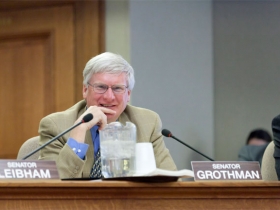
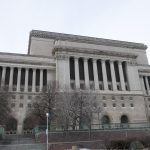
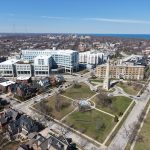

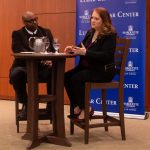
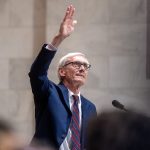















I have a hard time parsing the rebuttals to this issue. There’s a lot of whining on the matter. I will confess your article has done better than most in defending the desire of metro areas to have more time.
But.
Deal with it. Surely someone in these two municipalities is smart enough to put through the same number of voters under the new restrictions. If not, have them call me. I have one or two ideas that should be worth considering.
The quote at the end from the League representative is baloney, by the way. This law is about early voting, not absentee voting. Any voter as busy as that quote describes can request a ballot by mail.
That’s where the left loses these types of arguments. The tendency to throw anything against the wall to see if it sticks keeps most of us on the right completely uninterested in listening.
The notion of “no excuse” early voting has made voting and voter equity so much more complicated. It opens up so many more issues. We already have processes in place for people who can not appear on voting day by providing mail-in absentee voting, in person “with excuse” voting, laws that require employers to provide time to employee’s to vote if their work schedule makes that a challenge, and more.
You can point to actual turnout all you want, but the fact is that current rules limit suburban and small town voting due to resource limitations and it limits urban voters because of long lines. I’m sure there are more reasons than those that further complicate the situation. The only way to keep things truly equal is to revert back to a system that requires a valid reason to vote early. Otherwise we’ll see a continued back and forth about what is fair or not fair… until that time, I suppose these minor tweeks to try to balance the system.
Some people may be concerned about the right to vote, but I am a little perturbed about the freedom of the press.
For instance, when Grothman says . “It’s a matter of uniformity. I don’t know what all the hoopla is over,” why is the press unable to follow up by printing that he’s a fucking moron. It really belongs in this story. Other unacceptable words are asshole, bigot, and of course racist. And given that he’s white it is apparently inappropriate to call him a thug.
If the media can’t use the best words to describe him how are we as citizens to be properly informed?
Matt, while not everyone will delight in your choice of words, your comment really has me laughing. Thanks.
Matt, why do you have such hate and vitriol for Glenn Grothman? Is it because conservatives like Grothman want to take away your welfare check and your bogus SSI disability check and your rent assistance check and your food stamps, thus forcing you to get a job?
Matt, according to a quote in the article, the issue is that this “would reduce opportunities to cast a ballot for voters who have daytime jobs, daytime classes, elder and child care or frequent travel obligations”. So really we should find the money to allow more opportunities for people in suburban or rural areas these same considerations. It doesn’t matter how long the line is if you’re not able to make the time. Or are they all bigots because they go to work?
“This law is about early voting, not absentee voting.”
Early voting is absentee voting.
Some people are all for democracy until they’re in the minority. Then they have to start changing the rules of the game to give themselves a fighting chance. Until, of course, the day comes when even that doesn’t work, and they find themselves so badly outnumbered that they’ll do what all self-absorbed, cynical and selfish brats do: They destroy the game itself. In real world terms, the game is Democracy. Wisconsin Republicans are painting themselves into a corner. It reeks of desperation. And it’s a losing strategy that hurts not only themselves, but the very institutions their forefathers lived and died for. Shame on them.
Many people think that suppressing early voting is no big deal because people can always vote absentee. But absentee voting has problems:
1. Early and regular voting is secret; absentee voting isn’t. Your name appears on the envelope. If absentee votes are counted at all (and they usually aren’t), the voter’s name is called out, the envelope is opened and then that person’s votes are called out. Any political operative in that room knows how you voted.
2. Absentee votes are much easier to throw out than regular or early votes. Any little difference in your signature or an error by the witness can cause somebody to challenge your vote. If somebody challenges you at a polling place (even when voting early), you can respond; you cannot respond to a challenge to your absentee vote.
3. Absentee voting is more complicated requiring a lot of steps. To vote absentee you must:
a) request a ballot
b) wait for it to show up in your mailbox
c) photocopy a proof of residency document
d) find a witness
e) vote in that witness’ presence
f) fill out the envelope in front of that witness
g) mail it in
4) Absentee voting requires perfection. If you make a mistake during regular or early voting, you can request a replacement ballot on the spot; if you make a mistake on an absentee ballot, you must go back to the beginning (provided you still have time).
This bill was targeting the weekend get out the vote campaigns in the city. Inner city programs get more volunteers on weekends to get to the neighborhoods that have lower vote turn out. Republicans know this is almost 100% democrats so they went after it like they do everything else. Working towards a one party state.
Dear Suburban Cindy: Please do support your claim of solutions, or it’s just typing. Please provide even one of your examples of your deep thinking that would work not for your Brookfield but for Milwaukee, by telling us how you would provide even two minutes to cast a vote, beyond that nine seconds per vote, in the big city — and, of course, because you are fairly conservative, with only minimal increase in costs similar to the current practice of rotating the staffing in City Hall to cover more hours. As you say, deal — or fold your cards when your bluff is called.
Eric – Tada! Yes. You win the prize. No doubt this bill was exactly about targeting the urban GOTV effort which is predominantly a Dem effort. Every person still has an equal opportunity to vote in any community, but the days of rounding ’em up and promising a pack of cigarettes are more tightly limited now. You have to concede the Republicans have done a fine job of sticking to their message during this change.
Keep in mind Wisconsin was predominantly Democrat for many years. The pendulum swings. It will swing back some day. That is the beauty of the system the founders created.
This is more “elections have consequences” action. Don’t like the new districts? Don’t like this law? Don’t let your party lose a majority in one of the houses next time. Fight to get it back now. Whining about a bunch of politicians not playing “fairly” won’t get you anywhere.
As an equal example, I truly dislike the Affordable Healthcare Act that slipped through a quick vote a few years ago when the United States government held Dem majorities in both houses and also a Dem president. But I got it anyway!
Dear Cream City,
Bruce and I are two hours into a discussion on my ideas. He’s offered to let me write it as a separate column.
1. If you don’t want to like my ideas, you won’t like them no matter how clever I might prove.
2. Bruce’s metrics (the seconds and minutes you quoted) might not be the best measurements available.
3. There were very long early voting lines in Milwaukee before this bill. Why did no one complain about those voters not getting a 2 minute vote?
4. I’d be looking at total cost from the previous arrangement versus total cost per this arrangement. And I don’t have the details of the current arrangement, so that would be necessary before I put a specific plan out there.
Of all my points the third is my favorite. Why weren’t Milwaukee voters afforded a 2 minute early voting wait time prior to this bill? If any plan concocted gave the same voting turnout and the same voting wait time as before, you’d have to concede it worked.
In a democracy, we should be encouraging all citizens to exercise their right to vote. After all, many people over many years fought for this right to vote. It is a dishonor to to them to make it difficult to vote. Every citizen who wants to vote to should be able to vote. It is up to elected officials to set up a system that ensures that everyone wanting to vote is able to do so. Other countries allow voting over several days. Why have the voting day just be on Tuesdays, or weekdays? Why not have the voting period include weekends? I am sure other people can think of ways that would work to enable as many people as possible being able to vote. That should be the guiding principle.
Cindy K (post 11), yes, elections have consequences, but the end of free and fair elections should not be one of those consequences.
I used to be proud to be from Wisconsin. Now I am embarrassed and ashamed.
Bruce-The local paper and liberal blogs have been talking about this for the past few days. It’s old news. Also, League of Women voters is not nonpartisan, they are liberal.
Anyway, no special voting days for Milwaukee. And if you don’t like it, go bang your drum and sing all day. Or start the recall petitions again.
White liberals should worry more about the inner city mess they’ve created. Not weekend voting. Top ten violent city, a failing school district, poverty, transit, etc. Look at successful cities like Minneapolis, KC, Denver, Indy and get your act together
If it matters to you, and it is important enough to you, you will go vote on election day. You should not have to be bribed with a ride, a chicken dinner, or anything else. If you are elderly or infirm, most candidates in Milwaukee offer rides to the polls. All of this early voting is just an attempt to get more inner city voters to the polls, usually with an incentive. You liberals aren’t fooling anyone with your constant disenfranchising voters claim.
I’d like to know how residents of outlying areas are harmed by having people in Milwaukee or Madison able to vote more easily, unless any of them have the guts to claim that they are more worthy of the vote than city residents (whether because those are poor, or young, or aren’t property owners, yadda, yadda.)
If that’s the case, that it galls them that the vote of a student or a welfare recipient equals that of an upstanding Waukesha County property owner, they should take this up with Lyndon B. Johnson or Andrew Jackson.
And one of the few justifications offered for this is that extended hours are too much of a burden on clerk’s offices. Since when were Republicans so solicitous of government employees other than cops?
P.S. to Cindy K
You advise those of us who dislike this law to overturn the Republican majority in the legislature. Fat chance! The Republicans have already thought of that, and gerrymandered the districts to guarantee themselves a decade of majorities. The proof: more Wisconsinites voted for Democratic than Republican Assembly candidates in 2012, but the GOP bagged a 20-seat majority anyhow. They planned it that way.
To Bill Kurtz,
Damn right they did!
Bill, I’m tired of the proof you provide for why the GOP rigged the state voting results. The three census districts surrounding my house have more people living in it than the entire Village of Elm Grove and that’s just Brady Street. If a Democrat runs unopposed for the State Assembly in my District they will win by over 5000 votes. Democratic voting districts are more densely populated. Unless they drew up the districts like slices of pie emanating from the center of Milwaukee it won’t matter.
Perhaps the legislature should cut out the hypocrisy and just pass a law that says only Republicans can vote.
Apparently all the others are just concerned about their bogus welfare checks, etc., so they really don’t deserve to vote.
Cindy K, Redistricting happens every 10 years, and 10 years go by in a flash, as you know, and payback is a… you know that too.
Republicans cannot win on their message of anti-education, anti-science, anti-minority, anti-freedom and rights, anti-women, anti-union, anti-worker, anti-environment, anti-public transit, anti-urban, anti-planning, anti-energy efficiency, anti-renewable energy production, etc. Republicans only stand for their own power and corrupt system of governance for and by their benefactors, the corporations brought with laws from ALEC. So they resort to restriction of voting rights that targets elderly, minorities, and teens thereby making it more inconvenient for everyone. Money and laws would be better spent on making government more efficient for the people and investing in improved state-wide training for poll workers, the voting apparatus and a tabulation process, and making voting as efficient as possible for citizens, that saves them time and travel costs. Government is for all the people.
The most offensive thing about Republicans laws – they were funded by corporations and written for them by ALEC. This is the Republican version of current day fascism.
Everyone who claims that this bill makes the vote of the small community voter more important than the urban voter is somehow ignoring that right now urban voters get more time, more chances, and more flexibility to vote than small community voters do. If you really cared about making elections free and fair, you would recognize that the ability to vote should be the same for urban voters AND the majority of the state that hails from a small jurisdiction.
As concerned as republicans are about curbing the advantage of urban voters being able to vote during a much larger window of time, Democrats are concerned about keeping that large window of time. The democrats know they have that bigger window and they want to keep it that way… they know that small districts don’t have the resources to provide it… and the Democrats realize they have a great sound bite to say republicans hate urban voters because they (the GOP) are trying to disenfranchise those urban voters.
Why don’t I ever see anyone trying to push legislation that would provide resources for districts large and small to have flexible hours and short wait times all around? Another thing I don’t see is people admitting that voting is more than just a right, it’s a responsibility. While there are legitimate reasons for absentee/early voting, too many people do so out of pure convenience. We can’t waste time and resources just because people can’t take time out of their day to do their civic duty.
Why doesn’t the Wisconsin Republican Party just be honest for once?
Just pass a law making it illegal for anyone by 100% white folks to vote in elections in Wisconsin? Seriously. If challenged, guaranteed that the Wisconsin Supreme Court would uphold the law, probably on a unanimous vote.
If challenged in Federal courts (there might be something in the US Constitution that would invalidate the law), not to worry either. Wisconsin Republicans, whether they are in the Assembly, State Senate, or Governor’s office are ABOVE any laws in the State or America. Scott Walker’s gang has already taken Wisconsin back to the 1950’s in terms of voting rights, labor laws, social policies, etc… Now it’s time to turn the rest of America into the utopian state that Wisconsin has become.
In Wisconsin, Walker’s gang scapegoated union members for all the economic problems of the state, thereby “justifying” Act 10. That sick message was supported by hundreds of millions of Koch dollars spent in a media blitz lasting for months.
Why not go for the ultimate prize for corporate control, taking away the right to vote for minorities who tend to support candidates that hold corporate control of America in check? Time for Scott Walker to get on the phone to the Koch brothers and drop a new “bomb’ in Wisconsin, taking away the right to vote for all minorities in Wisconsin. I’m sure his Koch benefactors would gladly spend another 250 million dollars supporting this bold, Republican policy initiative.
I worked in Fayette County, Tennessee in the 1960’s to secure voting rights for Black citizens. Over 70% of voting age citizens were Black but virtually none were registered when our program began in the 1950’s. Any Black who registered was thrown off their farm if they were a sharecropper, “blacklisted” (which prevented them from shopping in grocery stores, pharmacies, gas stations, or holding a job), and subjected to physical and verbal abuse (including death in a few cases.) Unequal use of government funds as a result was obvious: White communities had paved roads, Black communities had dirt lanes; White schools were spacious and modern, Black schools crowded, aged and run down, juries, chosen from the voting rolls were all-White. With incredible bravery and persistence, as Blacks began to be able to vote, things began to change. From my perspective there is no more important right. No one should fool with it.
There is a large efficiency of scale in an urban setting. We should not seek the lowest common denominator of the rural setting voting standards. This is true for many services like water supply, road construction, electric and natural gas utilities, school buildings, postal services, etc. We should seek efficient and consistent voting services across the entire state and maximize the opportunity to vote. It is a fundamental right that on that particular day, you are equal to a Koch brother.
Laws written by corporations through ALEC and implemented by Republicans are for the benefit of the corporations and their economic profit. They are not written to benefit the citizen and their rights.
So if smaller rural communities get a greater percentage of eligible voter turnout than the big cities, what problem does this solve? Unless current legislation prohibits smaller communities from also having unique early voting hours and the opportunity to raise the necessary revenue to meet the needs of their community, it really does seem the goal of this bill is to suppress voter turnout. Anyway, let’s hope the Governor signs this quickly, it should make for some entertaining campaigning.
David, you say, “We should seek efficient and consistent voting services across the entire state…” Do you recognize that many smaller communities and jurisdictions don’t have the resources to match the voting services of Madison and Milwaukee in terms of voting times, availability, recruiting volunteers, etc?
If that is the case, then you also must recognize that by having some jurisdictions which can provide greater opportunities to vote then you are doing the exact opposite of what you say we should do. It just so happens that the jurisdictions that can provide the greater opportunities to vote are heavily Democrat… which is why Democrats push to keep this inequality alive.
Max, my gratitude for your work in the 60’s. What happened in Fayette County can never be understated for it’s importance in our country’s history.
For those Millennial’s who read this blog but know little of our history, would you mind pointing out which political party was voted in by all the these courageous African American voters and which party the members of the WCC belonged to?
Politics ain’t beanbag. Elections have consequences. Fine. I get it. But this is just transparent voter suppression. It is anti-democratic in the most fundamental sense. Once again, Republicans are poisoning the well that we all drink from. I wonder just what would Grothman and company consider over the line. Is there a line? Is there for them any good that is not wholly subsumable within partisanship?
Please, please, stop being so cynical by justifying this move as a way to “level the playing field” for rural counties. The first two paragraphs of the story explain why that’s a bogus argument. This is a naked attempt to limit voting in urban areas, precisely BECAUSE they tend to have a younger population, a more diverse population, and one that votes more heavily Democrat. It’s a population, by the way, that is open to new ideas. But if a political party has no new ideas to put forward, at least it can behave in a way that isn’t hurtful to the spirit and practice of Democracy.
Andy (post 25), as I understand it, the new bill effectively bans early voting for many in cities while continuing it for everybody in “small communities”. Outside cities, early voters will face little or no wait, while city voters will be forced to wait (mostly outside) for HOURS, making it prohibitively expensive for people who work.
When suburban/rural voters only need to give up 5 minutes (all indoors) to vote early while urban voters must allot as much 5 HOURS (mostly outside and entirely without access to bathrooms). I don’t want to be indelicate here, but some people need frequent bathroom breaks and simply cannot wait 5 hours. Making lines that long simply prohibits early voting for those people (but ONLY if they live in cities).
Voters in smaller communities can easily vote on their lunch break; those in cities must take off a day without pay.
It is not “free and fair” to allow smaller community voters to be in-and-out in 5 minutes (all indoors) while sending urban voters to the back of the line so they can wait (mostly outside in the rain) for 5 hours while making all possible remedies (expanded hours, multiple polling places, or bigger polling places) illegal.
Even with weekend voting (which this bill bans), fewer people voted early in cities than in “smaller communities”. Milwaukee and Madison have 15% of Wisconsin’s population and cast 14% of the vote (in the 2012 Presidential election), but cast only 11% of the early vote in that election.
Even with the expanded hours, it was not a level playing field (since early votes were coming disproportionately from “smaller communities”), and this bill tilts the playing field even more (by reducing hours ONLY in cities).
Raul, the first two paragraphs do nothing of the sort. All that tells us is that DESPITE having more opportunities to vote, urban voters still tend to do so at a lower rate. A lack of resources to provide that same level of voting availability is well documented, despite what the left’s talking points try to tell us.
Instead of spending on illegal voter suppression ID laws, that money could go towards improving consistent voting standards across the state including rural voters.Voter ID, is another form of suppression directed at Democrats with hidden poll taxes of lost time and paying for additional records. Some 18-year old citizens in the inner city do not have the $25 to obtain a birth certificate, do not drive, and the bus routes do not run to DMV offices.
Republicans work for the benefit of corporations, not the working class citizen. Decreasing Democratic voting turnout, increases their opportunity for power with their paid off politicians. These corporate ALEC laws are the most insidious erosion of citizen and human rights.
David, you said it better than I could. On election day, you and I are equal to a Koch brother if we vote.
Andy, those White Citizens Council members probably WERE Democrats, just like Strom Thurmond and Jesse Helms were then. As to which party they ARE backing now, Thurmond and Helms switched to the GOP, and voting records show most segregationists went the same way.
Tom, this bill does not just affect the city… it’s all jurisdictions. But you are right, the long lines Milwaukee must endure is ridiculous. When I had to early vote in 2012 I had to wait over an hour, which is unacceptable. If we followed my suggestion to either provide the necessary resources for all jurisdictions to have equal voting opportunities (for volunteers, paying clerks overtime, providing more locations, etc) OR we eliminate the “no excuse” early voting… then we would solve both small and large community challenges.
No special voting days for Milwaukee, everyone votes the same days. Two weeks is plenty of time. Too bad and if you don’t like it go bang your drum, run to llinois or sing together in Madison.
David, ID’s are needed to do ANYTHING these days. Even democrat voter rallies require ID to get in. If the voter ID law is struck down, the state is prepared to rewrite the law to make obtaining a birth certificate free of charge. I support that. If they do, would you then support the law?
For many on the left, the ID law conversation is only important because they want the minority vote, not because they actually care about their rights. Many of those same people who claim that the right doesn’t care about the rights of minorities are the ones who actually don’t care.
Do you actually think it’s ok that people don’t have documents that are required to do ANYTHING in today’s society? You can’t get a job, you can’t purchase a gun (another right, just like voting), you can’t buy gold coins, get on an airplane, or for heavens sake even buy cough syrup! Finally, coincidentally and thankfully, because of voter ID laws, we give people who otherwise wouldn’t have had the means to pay that $25 for a birth certificate or the fee to get a state ID, to get the documents that are so vital to being a member of our society.
But I digress… that is so completely off topic.
We have serious issues that we should be dealing with in this state and across the country (jobs, fairness and equality in taxes, an energy policy that includes energy efficiency and renewable energy, access to health care and ACA). Instead Republicans have to drag up social and rights issues to divide and conquer the voters. It is all about obstruction, distraction, distortion, lies, and carve up voting blocs so they can maintain power.
We have the capability to cut energy consumption by 50% in a few decades time. Wisconsin sends $12 Billion annually out of state. A heavy emphasis on energy efficiency, solar panels that now are a better investment than just about anything on Wall Street at a 10% annual return, on site energy storage with thermal mass furnaces and hot water heat pumps, time of use rates, and load control would go a long way towards this reduction and get the same level of work. The $6 Billion that would stay in state would go a long way towards cranking out economy with local labor and materials for remodeling all buildings.
We have huge pot holes in existing roadways that have been neglected for decades. These roads need reconstruction and not pot hole filling. These are real jobs and improve transportation efficiency, comfort and safety, instead of passing on car and truck damage to the owner from broken tires and suspension systems. Walker hopes to skip away before everything collapses on his watch, is caught in his illegal activities and jailed, and leave his mess for the next guy.
The Republican Party is a dead end decaying piece of rotten flesh bereft of any real ideas, solutions, or vision. They feed on hatred and division and kept on life support by funding from corporations and their Koch addition. In the meantime the entire state flounders in their rotten stench that we all suffer and pay for in the end.
Andy,
A. Stop lying. B. The first two paragraphs do require you to do some spacial/mathematical inferences and perhaps you might have problems deducing the difference between hundreds of thousands of people trying to do something in one place, and a couple thousand trying to do something in the same place.
Tom D connects the dots for you: “Outside cities, early voters will face little or no wait, while city voters will be forced to wait (mostly outside) for HOURS, making it prohibitively expensive for people who work.
“When suburban/rural voters only need to give up 5 minutes (all indoors) to vote early while urban voters must allot as much 5 HOURS (mostly outside and entirely without access to bathrooms). I don’t want to be indelicate here, but some people need frequent bathroom breaks and simply cannot wait 5 hours. Making lines that long simply prohibits early voting for those people (but ONLY if they live in cities).
“Voters in smaller communities can easily vote on their lunch break; those in cities must take off a day without pay.”
Andy (post 36), you say: “this bill does not just affect the city… it’s all jurisdictions”.
Please name one jurisdiction (other than Milwaukee and Madison) that allowed early voting on weekends. Of course it applies to all jurisdictions–it would be blatently unconstitutional if it didn’t (and it still may be), but it eliminates weekend voting in only two places–both of which, just co-incidentally, voted overwhelmingly (79%) for Obama in 2012.
Wow, the bickering here is worse than usual. Just kill early voting all together and get back to the fair Tuesday only and absentee voting. Lots of locations and worked for decades. Same times for the suburbs, same lines for the cities. You get something a little extra, a little more convenient, and you whine about who has the biggest piece like little kids. Sure, it’s not better or more convenient for anyone, but at least you can move on to complaining about something else.
Tom D, if the democrats were in power and they passed a law that alleviated the lines that Milwaukee and Madison voters face during early voting, but failed to address the limited times available to smaller jurisdictions, would you also oppose that?
Unlike most people here who feel they must only support “their” party, I would support that legislation as well. Long urban voting lines and suburban/rural lack of voting times are both issues that create an inequality in voting. Support fixes for both, or support eliminating all early voting as Kyle suggests.
Andy asks (post 46): “If the democrats were in power and they passed a law that alleviated the lines that Milwaukee and Madison voters face during early voting, but failed to address the limited times available to smaller jurisdictions, would you also oppose that?”
No, I would support that, because it would be fair and truly apply equally to everybody.
Milwaukee and Madison don’t deserve special treatment–they are only looking for some way to alleviate the lines (and until this bill, extended hours–including weekends–were the only way to do that).
Kyle (post 45), I think Milwaukee has had early voting for decades, but it was little known for much of that time.
I voted early (in the Municipal Building) in late October, 1972. I knew I would be out of town on election day and planned to vote absentee, but my mother (who was active in the League of Women Voters) told me it would be simpler if I just went downtown on a weekday to vote (early) in person.
As I remember it, there was absolutely no line and I was in and out in a minute or two. Although Milwaukee adopted (lever-style) voting machines in 1968, early voting in 1972 still used a paper ballot, and there were one or two standard-issue voting booths in the corner of the room. I remember this all quite clearly since 1972 was the first year I was old enough to vote.
Milwaukee and Madison are not using weekend early voting to “stuff the ballot box” to get an unfair advantage over other areas.
Even with weekend voting, Milwaukee and Madison have a lower percentage of early votes than the rest of the state. (In Milwaukee 12.6% of votes are early, in Madison, 12.5% are early, in the rest of the state 17.4% are early.)
Tom, it sounds like in 1972 you filled out an absentee ballot in person with the previous “with excuse” law in place. The lines and times from that system seem agreeable to you, so presumably I can count on your help to roll back the clock so everyone can vote like it’s 1999.
First time I voted in 1972 after getting out of the US Army, I just raised my hand for the oath and was off and running to vote. I knew who I was then and where I lived.
Voter ID is another major related issue. Walker has already stated he will call a special session if the WI Supreme Court upholds the ban that Voter ID is unconstitutional. Evidently, the sleazy Walker already is thinking ahead and probably has an ALEC work-around to screw people out of their voting rights. No expense is spared for a special session so Walker can eek out an election since recent polls show a tie with Burke.
The entire voter ID issue has been covered before and I would not agree with it at all. My wife just went to renew for her Driver’s License but could not obtain the official ID since she was missing the Marriage Certificate showing her maiden name. So obtaining a real ID is not quite as simple as it sounds even for people with means. The majority of us essentially do not have an official ID unless we were grandfathered somehow. Many people do not have birth certificates especially if they came from rural and out of state locations. Records are also lost due to fires, floods, and hurricanes, and other acts. Obtaining background records can be expensive and very time consuming.
Voter fraud is a myth. Spend this money on improving the voting apparatus, training, hours of operation, and expanding our rights.
What happened to all the older comments? When I click on “<–Older Comments", I just the this page reloaded (with only one comment).
Kyle (4:22 pm), I don’t think it was an absentee ballot. I had voted absentee earlier that year and the absentee ballot had two parts: the ballot itself and a special envelope (which the voter had to sign). As I remember it, I never saw or signed an envelope in the Municipal Building.
Either way, though, it’s not important. What is important is to understand that absentee ballots are not secret ballots and are not a good substitute for early voting.
Yes. The older comments seem to have disappeared.
Some of those (now missing) comments remind me of Anatole France’s famous statement: “In its majestic equality, the law forbids rich and poor alike to sleep under bridges, beg in the streets and steal loaves of bread.” The point is that apparently equal treatment can result in very disparate effects. Residents of Milwaukee (and Madison) often face much greater challenges in early voting.
Take distance. According to Google Maps, a resident of the far Northwest in Milwaukee would take 28 minutes by car and almost 2 hours by bus (faster by bike) to get to the Municipal building to vote.
Todd (2:12 pm), two weeks (at 40 or 45 hours/week) is not enough time for a single office to process over 36,000 voters (the actual number of Milwaukee early voters in the 2012 general election).
In November, 2012, the average Milwaukee ward processed 773 voters on election day. (Milwaukee has 325 wards.) Even with so few voters spread over 13 hours, Andy (in his post at 1:52 pm) said he encountered a one-hour line. Now, increase the number of voters 47-fold, but only increase the hours 6- or 7-fold, and then add the complexity of dozens of different ballots, and you see that two weeks (at 40-45 hours/week) simply isn’t enough if Milwaukee is limited to a single, small location.
And even 36,000 early voters represents a good deal of voter suppression. In Wisconsin (outside of Milwaukee and Madison) 17.4 percent of votes are “early”. If 17.4% of Milwaukeans voted “early”, there would be 50,000 early voters in Milwaukee.
While I do find it obvious the Republicans are trying to game the system in their favor, I’m not worked up about this change.
People should vote on election day, unless impossible to do so. Instead, early voting has become this personal convenience pleasure, and (often small) municipal staffs have to figure ways to deal with high volumes of people not voting on the special day set up to do so.
In conclusion, get off my lawn.
Or one could go the other way, make it harder to vote all the way around.
Require a working knowledge of Evolutionary Theory, for example, might raise the level of democracy in what seems like an undemocratic way.
Well you got one thing right: the bill will suppress the vote of Republicans. Since Republicans are the ones who go to work, shortening the hours available for them to vote will effectively suppress their vote!
Tosay’s Wisconsin GOP is an embarassment to their forefathers who defended the institution and spirit of democracy with their blood. Too many are deeply cynical, proudly uninformed, and more than willing to toss the chessboard up in the air if they can’t win fair and square. Sad…
Only in a dishonest mind would making voting hours uniform in all 72 counties be considered voter suppression.
Smokes for votes is such a better idea…
@This Side Because all of those counties have the same population numbers right? Please, this is transparently an attempt to suppress the vote in population dense areas.